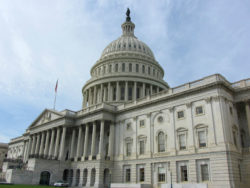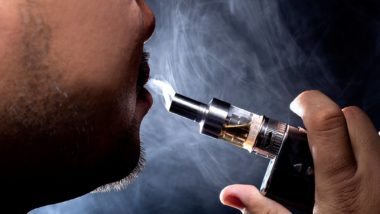 A House subcommittee alarmed by health concerns with JUUL has started a new investigation into whether the e-cigarette company marketed to children.
A House subcommittee alarmed by health concerns with JUUL has started a new investigation into whether the e-cigarette company marketed to children.
JUUL was already the target of a similar investigation started in April by Democratic senators who question JUUL’s level of participation in the uptick of youth who vape.
JUUL has breathed new life into “smoking” by creating and marketing JUUL e-cigarettes that look nearly identical to USB drives. The e-cigs plug into the USB port of a computer to charge. When plugged in, the JUUL is hard to distinguish from a USB drive.
JUUL “pods” are placed within the JUUL e-cigarette where the nicotine-laced juice is heated into a vapor; thus, the term “vaping” instead of “smoking” is often used. Health advocates are concerned that teens who would never think of smoking may take up vaping instead because they are apt to believe they are only inhaling water vapor.
Most youth don’t realize that one JUUL pod can have more nicotine than is found in an entire pack of cigarettes. JUUL pods come in two strengths of nicotine and in several fruit-based flavors.
Rep. Raja Krishnamoorthi, chair of the House Oversight Subcommittee on Economic and Consumer Policy, wrote a letter to JUUL CEO Kevin Burns, which told Burns the committee was ”extremely concerned about reports that JUUL’s high nicotine content is fueling addiction and that frequent JUUL use is sending kids across the country to rehab, some as young as 15,” Gizmodo reports.
Among the reasons Congress is concerned JUUL began its marketing strategy directed at youth are:
- JUUL advertising used young-looking actors/actresses/models
- Introduced fruity flavors that don’t allow the vapor to smell or taste like cigarettes
- Initially used social media favored by young people to market the JUUL
As part of the investigation, Krishnamoorthi has asked JUUL to turn over documents from as far back as 2013 to see the strategy JUUL used in its early marketing days.
Until the U.S. Food and Drug Administration (FDA) declared regulatory authority over e-cigarettes, e-liquid and all related products in August 2016, the vaping industry was somewhat of a rogue that didn’t fit in a category that allowed for any type of regulatory control. The Trump administration has decided vape companies can have until 2022 to seek FDA approval and can continue selling vaping products through that period of time.
Health Concerns with JUUL
Because of the large amount of nicotine in a JUUL pod, the FDA is investigating 35 reports of seizures among teens who have used e-cigs since 2010.
JUUL delivers nicotine to the body quickly, which may be too much too fast for many teens who become addicted before they know it. It’s also possible that users could inadvertently swallow the liquid in the pods, putting them at risk for nicotine poisoning.
Seizures, vomiting and brain damage are all possible side effects of nicotine poisoning. Other health concerns with JUUL include potential detrimental effects on the heart and lungs, which are also seen with traditional cigarette smoking.
JUUL Banned in San Francisco
In addition to the proposed federal legislation, lawmakers are taking action at the local level. Last month, the city of San Francisco’s Board of Supervisors voted to ban the sales of e-cigarettes–including those marketed by San Francisco-based JUUL. Mayor London Breed signed the ordinance into law on July 1.
The ordinance will make it against the law to sell nicotine vaping products in stores or for online retailers to ship vaping products to San Francisco addresses.
This article is not legal advice. It is presented
for informational purposes only.
ATTORNEY ADVERTISING
Top Class Actions is a Proud Member of the American Bar Association
LEGAL INFORMATION IS NOT LEGAL ADVICE
Top Class Actions Legal Statement
©2008 – 2026 Top Class Actions® LLC
Various Trademarks held by their respective owners
This website is not intended for viewing or usage by European Union citizens.
E-mail any problems with this form to:
[email protected].












